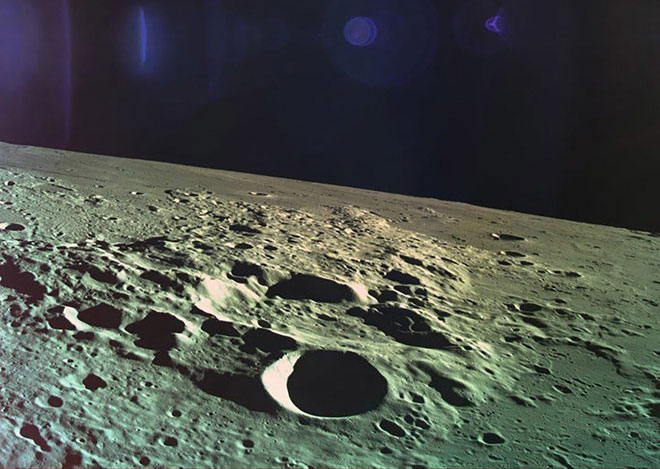What will happen if we destroy the Moon?
In the question this week by Giz Asks, Gizmodo interviewed astronomers thoroughly about the destruction of Earth's 'satellite'. Even though this idea has existed for a long time in science fiction, it is worth understanding what will really happen if this scenario comes true.
Caitlin Ahrens : Astronomer, physics, doctoral degree in Planetary Science and Space at the University of Arkansas.
Let's suppose we want to explode the Moon, 'for fun', what are our choices?
The moon is a spherical rock with gravity. This means that stones and dust particles are bound together by a 'binding energy ' - the minimum amount of energy required to disintegrate a block of particle structure into individual parts.

The moon is a spherical rock with gravity.
The moon is an object with a mass of 7.3x10 ^ 22 kg and a radius of 1,737 km.
In fact, turning it into ash is not quite easy at all. Anything smaller than the binding energy will cause the stones to re-assemble themselves into a sphere. The binding energy of the Moon is 1.2x10 ^ 29 Joule.
With these parameters, we have three choices:
- Nuclear : Constrained energy is converted to similar TNT energy of 2.86x10 ^ 13 Mega-tons of TNT. With the bomb with the most powerful destructive power of the Cold War producing 50 megawatts - then we need 572,000,000 bombs to destroy the Moon!
- Lazer : The energy from the Sun generated within 6 minutes is 3x10 ^ 13 Mega-tons - just enough to evaporate the Moon completely!
- Drill : In order to happen, we need to create an earthquake on it with at least 16.45 Richter intensity - while the largest earthquake recorded on Earth is 9.5 Richter scale.
Pamela Gay : Astronomer, writer, director of Technology and Citizen Science at the Pacific Astronomical Association.
How will the Moon's destruction affect the lives of living creatures on Earth?
If the energy produces enough for the moon to explode, the first thing that can happen is casualties to people themselves. The moon is retained by gravity and, in the micro direction, is a chemical bond between boulders, stones or even grains of sand. So, the fragments of the Moon will "fly" at great velocity - with large pieces that can create large sized pits, while small pieces will burn in the atmosphere.

If the energy produces enough for the moon to explode, the first thing that can happen is casualties to people themselves.
In some special cases, large meteorites that touch the Earth will create shock waves with the ability to create tsunamis, which is next to a large amount of debris flying into the atmosphere. In a collision place it can be so hot that it can evaporate large amounts of water.
Even if its small fragments fall without immediate damage, when the speed is reduced due to friction, the momentum gradually turns into heat. The more these small meteorites get into the air will lead to warming of the atmosphere. At some point, convection makes the Earth itself a furnace, and will grill anything that is not under the ocean and lying on the ground.
What about the tide if there is no Moon?
Nearly all of the water on the surface of the Earth will flutter.
It is intended that any river or ocean that is created after this event will not be affected by the tide - because there will be no more tides created by the Moon . In addition, it is possible that small rocks and Moon fragments can form a 'satellite' and will affect the environment, there may be new tides based on the loop cycle, distance and diameter of this object compared to Earth.
Konstantin Batygin: Astronomer and assistant professor of Astrophysics at Caltech.
But after this event, does the Earth shape change?

Without the Moon, the Earth will rotate very chaotic.
The moon is really valuable - it balances the Earth's rotation . Otherwise, Earth will rotate chaotic between 0 and 85 degrees. Although the time when such changes take place too long (tens to hundreds of millions of years), the chaotic transformation of Earth's oblique may have a negative effect on climate stability and the general habitability of our planet.
Therefore, we may not even exist without the presence of the Moon from the beginning!
- What if the Earth disappears?
- What happens when the Moon suddenly explodes
- 'Super moon' is about to appear
- Meteors make the Moon destroy Earth?
- Enjoy the beautiful fantasy 'blue moon' on the night of the Full Moon in July
- Scientists are angry because NASA canceled the mission to bring robots to the Moon
- Does the Moon have its own moon? And you will be surprised with its name!
- 'Werewolf' will appear tonight?
- If the earth has no moon ...
- 'Blood Moon' September will bring earthquakes to destroy humanity?
- What is super moon? When will Vietnam receive Super Moon?
- Interesting things few people know about the Moon
- Earth is about to lose the Moon?
- New NASA research: Water and humans can be found on the Moon, so come back soon
 Van Allen's belt and evidence that the Apollo 11 mission to the Moon was myth
Van Allen's belt and evidence that the Apollo 11 mission to the Moon was myth The levels of civilization in the universe (Kardashev scale)
The levels of civilization in the universe (Kardashev scale) Today Mars, the sun and the Earth are aligned
Today Mars, the sun and the Earth are aligned The Amazon owner announced a secret plan to build a space base for thousands of people
The Amazon owner announced a secret plan to build a space base for thousands of people